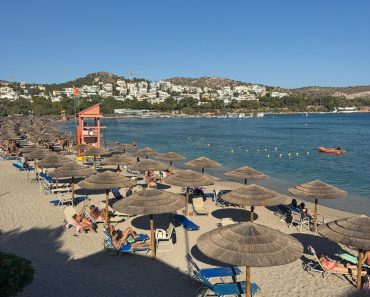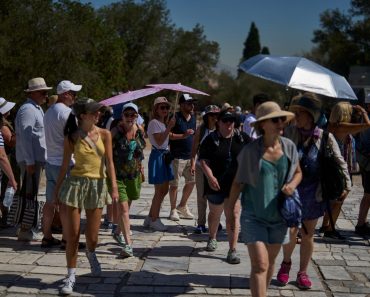
Nausica Ferros, left, and Amabel Kola make loukoumathes, a fried dough topped with honey and nuts, at Holy Trinity’s annual Greek Festival in Portland on Thursday. This year, the 41st festival, has Greek food for sale, music and dancing in the evenings. (Brianna Soukup/Staff Photographer)
Under a white festival tent lined with Greek flags, Holy Trinity Greek Orthodox Church begins its yearly transformation into a corner of Greece nestled among the townhomes in Portland’s West End.
Inside the parish hall, the women of the parish are busy putting the final touches on this year’s pastries being offered for sale. Dipping finikia (oversized cookies) in simmering simple syrup, cutting the karidopita (spiced walnut cake) and cupping the baklava in paper liners, the women are continuing a 41-year tradition for the church’s annual Greek Festival.
“Oh, how young Margarita looked,” said Dyonisia Giatas, holding a feature on the festival by the Press Herald from 1995. Margarita LaRosa wipes her hands on her apron, stepping away from the 15 tin trays of karidopita. She walks over to look at the yellowed newspaper where Dyonisia and Mary Gianibas are reminiscing on prior festival years.
“Look here, it says we had 2,500 attendees,” said Dyonisia’s sister Demetra, who serves on the festival committee. “Now, we’re at 10,000!”

Antonia Sotiropoulos hands a patron a plate of lamb souvlaki at Holy Trinity’s annual Greek Festival in Portland on Thursday. (Brianna Soukup/Staff Photographer)
Over the past 41 years, the festival has grown, and generations have come and gone through the parish. But the meraki — a Greek word that, loosely translated, means “a labor of love” — remains largely unchanged.
The recipes used for this year’s celebration, which begins Thursday, are the same ones prepared 41 years ago, passed down through generations with roots in Greece and Asia Minor. Cookies like koulourakia and kourabiedes trace their origins back to the Minoan and Byzantine eras, carrying centuries of tradition in every bite. Parishioners like LaRosa volunteer year after year, devoting their time and heart to the preparation.
THE PREPARATION BEGINS
In January each year, the festival committee comes together to schedule and plan the cooking and baking for the summer festival. Every food item, except the dolmades (stuffed grape leaves), is made in-house, requiring months of preparation and coordination.

Aleco Stratis, left, grills lamb and pork souvlaki with his dad Paul Stratis at Holy Trinity’s annual Greek Festival in Portland on Thursday. Paul Stratis and his brother Bill said they’ve been grilling the Greek specialty at the festival since 1990, taking it over from their father Thomas. He was born in Greece and came to the U.S. in 1958 at 15. This is the first Greek festival without their father who passed away in late May. “He always just sat back here with us while we grilled” Paul said. (Brianna Soukup/Staff Photographer)
Rick Mageles, the Parish council president, and Mark Butler, the festival chairman, lead monthly meetings with the eight-member committee after Sunday services.
During the initial meetings, the committee discusses the last year’s successes and potential changes to the upcoming festival. This could mean integrating more vegan options for diners, adding new pastries to the menu or even acquiring new equipment to make preparation more efficient.
“Mark’s really good at shopping on (Facebook) Marketplace,” said Mageles. “So, we’ve increased our inventory (of equipment).”
Adapting the menu for dietary restrictions or those who don’t like lamb was important, so the committee in previous years added pork souvlaki skewers and a green bean dinner to the menu. Both became popular items, said Demetra Giatas, a committee member.
Another change is the adoption of Square, the point-of-sale system, to track cash and card sales. This allows the church to keep an accurate record of the date and time of purchases, helpful for gauging how much food to order for next year, said Mageles. The money generated from the festival goes back to the church.
Sometimes these feedback sessions mean recognizing the shortcomings of previous years. This year, volunteers began baking the baklava — the most popular pastry — closer to the festival dates. “We didn’t have good luck last year when we froze it,” said Butler.
BIG FAT GREEK FESTIVAL
As soon as a date for each year’s festival is set and confirmed, Butler begins reaching out to suppliers — Mainely Events for tent rentals, Coca-Cola for soft drinks, and Micucci’s Grocery Co. for produce. He contacts them as early as possible to ensure they have time to prepare their stock.

Phil Notis, right, and Donald Carter have lunch together at Holy Trinity’s annual Greek Festival in Portland on Thursday. Notis said he grew up in the church and went to Greek school there. The friends also go to the Greek festival in Lewiston. “I’m not Greek,” Carter said with a laugh. “I just hang out with them.” (Brianna Soukup/Staff Photographer)
In March, food preparation begins to ramp up. First, the pastitsio and moussaka, Greek casserole dishes, as well as spanakopita — spinach pie — are prepared and frozen. In the following weeks, each weekend is dedicated to baking a different pastry — 3,420 pieces of baklava, then 5,000 koulourakia, then 700 finikia, then 650 kourabiedes.
Once the week of the festival comes around, the committee and volunteers spend each day from 9 a.m. to 5 p.m. completing final tasks.
On Monday this week, the committee turned 700 pounds of lamb — donated by a parishioner — into kebab skewers. Lamb is always the first item to sell out. Tuesday was dedicated to marinating 300 pounds of chicken. Wednesday, the committee prepared the pastries for sale and set up the tent.
Around 150 volunteers help serve food to 10,000 festival attendees over the course of the three days.
For the festival weekend itself, the committee hopes for favorable weather, which doesn’t necessarily mean bright, sunny days. Often warmer temperatures send would-be festival goers to the beach instead. Overcast days without the threat of thunderstorms are ideal, giving residents and visitors something to do during the day.
Lunchtime on Thursday brings a large crowd of families, Portland foodies and nearby workers lining up down the street to escape into a Greek oasis. The festival helps fill a void in traditional, authentic Greek foods in Portland’s downtown area.
The lamb, gyros, and spanakopita tend to be the most popular savory dishes, and loukoumades — Greek-style donuts — are also a hit.
“Many times people come for the food because they have been to Greece, and they want to dig in and enjoy the same food they had when they were visiting,” said Demetra Giatas.
IF YOU GO
Holy Trinity Greek Orthodox Church’s annual Greek Festival will continue through Saturday at 133 Pleasant St., Portland. Festival hours are 11:30 a.m. – 9 p.m. Thursday and Friday and till 8 p.m. on Saturday. Attendees can purchase meals and dine like true Greeks and experience authentic flavors, music and dancing.
There’s another opportunity in three weeks, when Saco’s Greek Orthodox Church holds its own Greek festival. Saint Demetrios’s Church is hosting their festival July 11-13. Visitors can experience another weekend of Greek culture from 11 a.m. to 9 p.m. on Friday and Saturday and from 11 a.m. to 3 p.m. on Sunday.
Beyond food, the festival will have a Greek market, activities for children, and traditional Greek dance performances Saturday evening.







